30 Sep Working with the Wayuu
The women’s cooperative we are working with are based in Riohacha just on the outskirts of the La Guajira desert. Upon meeting Paula we quickly learn she shares a lot of the same values as TMAC.
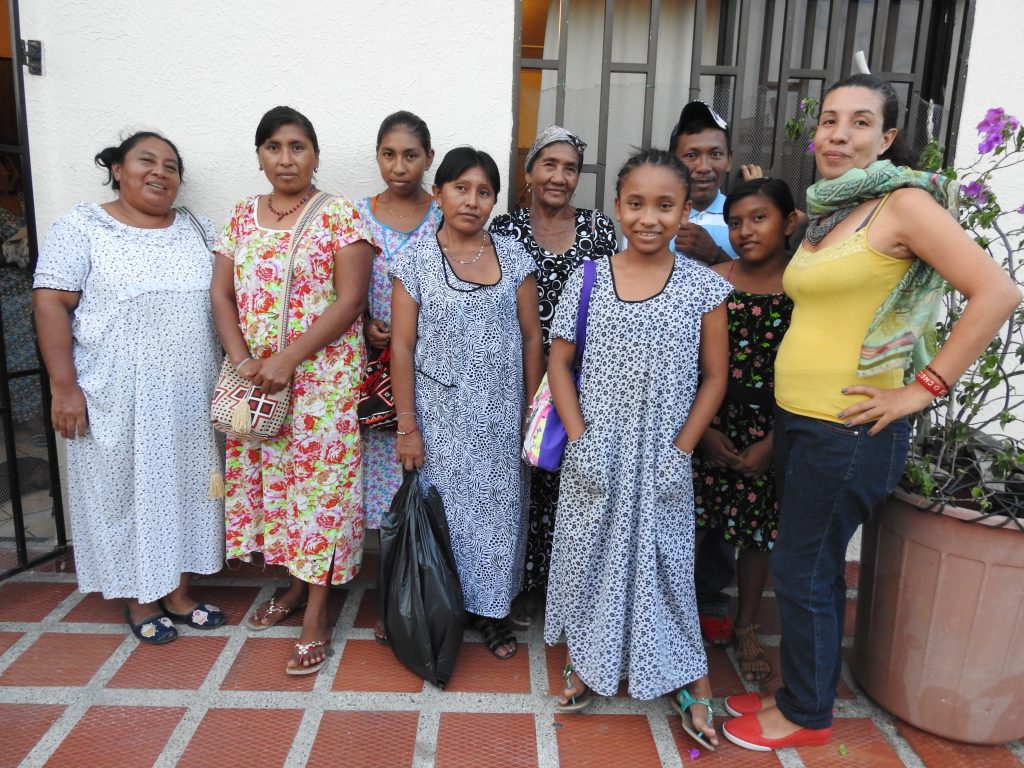
At the essence of everything they do is Fairtrade. Making sure they can make a sustainable living from their skills without being exploited.
There is complete transparency with the women at every stage showing the women the whole process from marketing, working with clients, selling the products and then paying women.
There were three things Paula said to me that really struck a chord “We are not just selling bags but raising families”, “Behind each bag we have a woman, behind each woman we have a family.” and she goes onto say they “Work as a circle, no one is above and no one is below, the women artisans have always in the past felt below and pushed aside by society.”
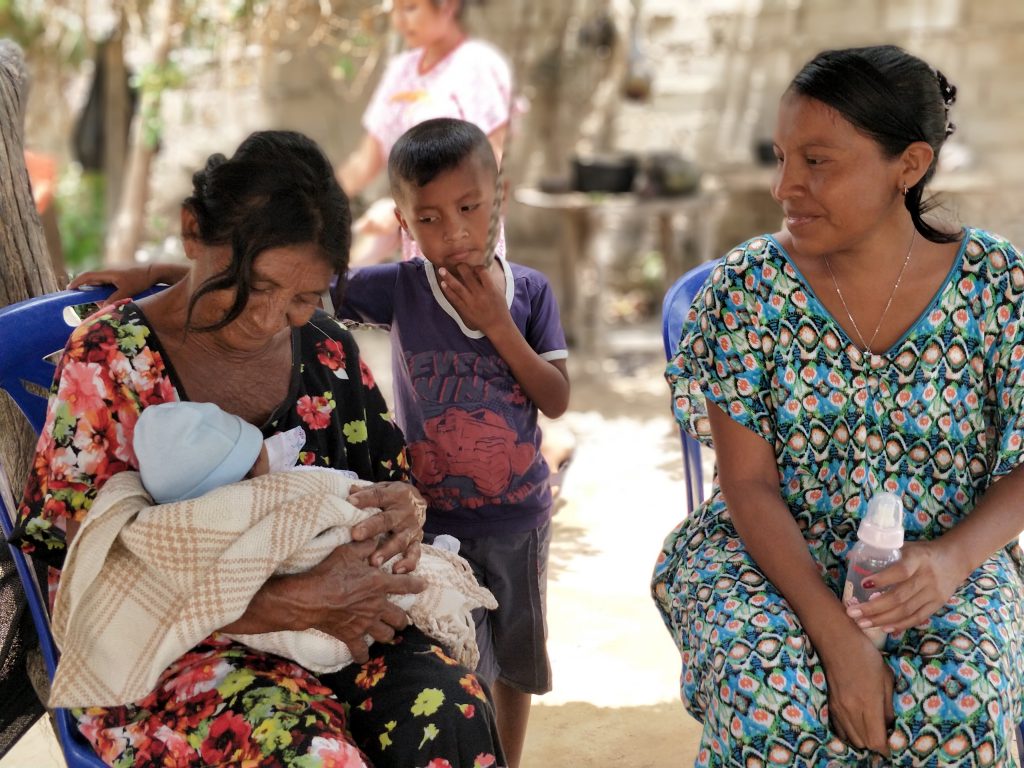
I can see it’s with their core values and these three points that the cooperative was born.
Paula works with the women teaching them the cost of the products. Not just taking into account the raw material cost but their time, transport costs and what they need to earn to make making the mochila sustainable for their families.
Without this knowledge, it leads to the women devaluing their work which and in turn can lead to self-exploitation.
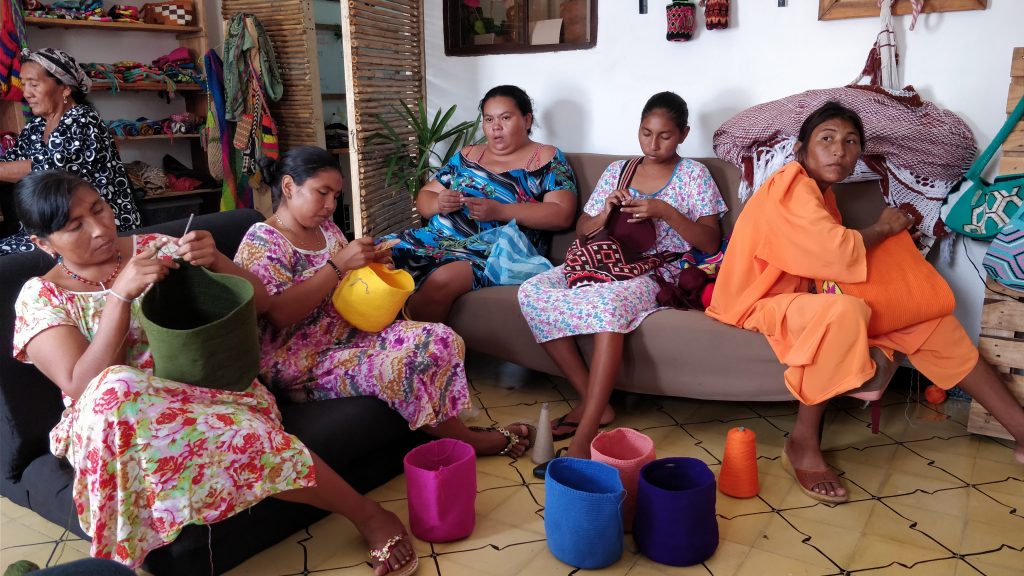
Each Wednesday Paula invites all the women to her house for an open day. Here she aims to bring the women together as a community, most of the women feel very alone and cut off in their rancherias. The women are also taught about the importance of quality, they swap their tricks and tips on how to better finish and work the bags all as a team.
One of the most Important parts of the day is learning. Paula gives lessons in, Spanish, business, women’s health, maths and more.
Paula doesn’t see herself running the cooperative forever but wants to women to take over and become self-sufficient.
The cooperative is open to all women they just need some patience and want to learn, it’s not free money but a way of learning and coming together which can lead to a better life.

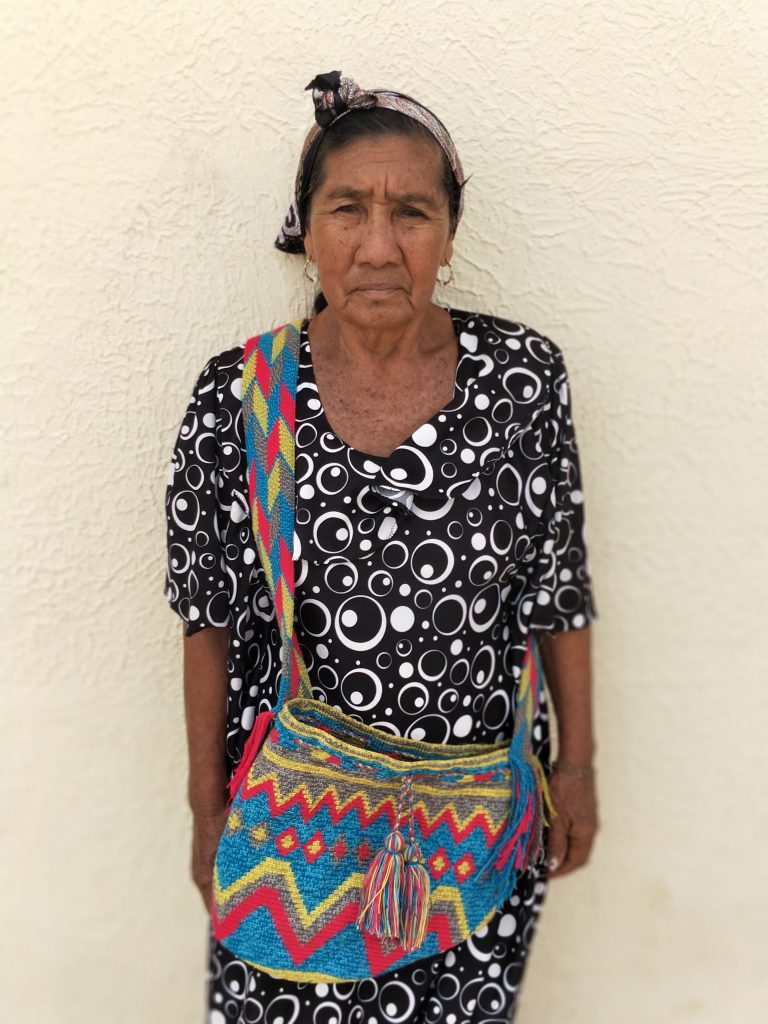
The cooperative is being successful and the example below shows the great way any profits are used to help the community.
Maria has 5 children and is 26 years old. She had a violent husband and came to the project after becoming pregnant with child number six. She had been thrown out by her husband who kept the three older boys, the project took in Maria and helped with social services, giving her somewhere to stay, getting her work and offering her a safe environment.
We want to learn more about the women and see there skills in action. Paula asks her to join her on a number of days as she visits some of the artisans she works with both in Riohacha and deep into La Guajira.
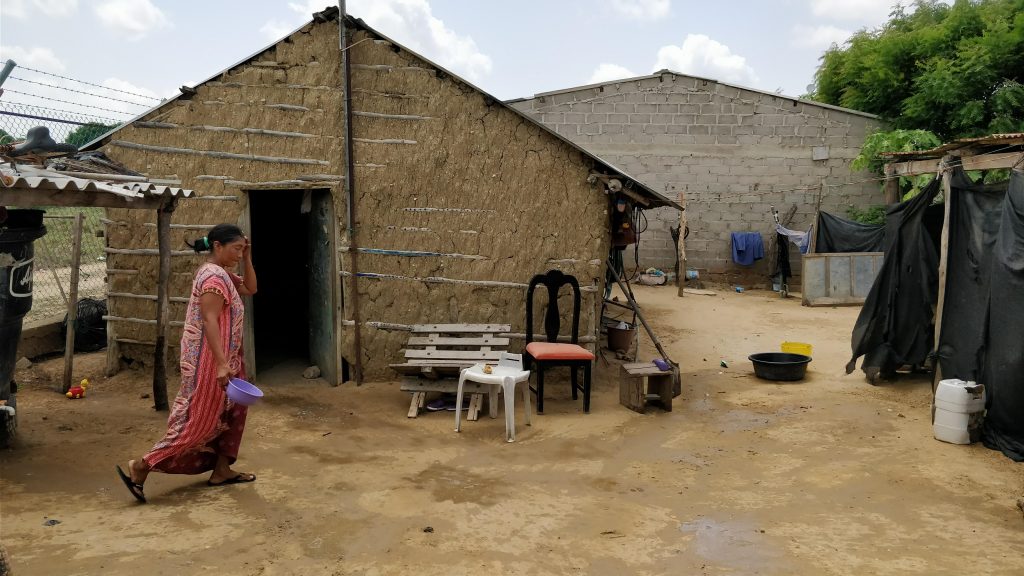
Riohacha
Our first day we are on the outskirts of Riohacha right next to the airport. Here we are meeting Maritza and Yaniris Epieyus family where we will stop for lunch. They are sisters and live together with their 7 children in there home which is a typical city Wayuu settlement, three buildings very close together. An indoor open fire kitchen, a building for sleeping and a large covered area where the family gathers. Marie is introducing the new baby to the family. As Wayuu tradition dictates a hammock is hung and the new member welcomed to sit. It’s only after this everyone comes to greet the new addition the Wayuu community.
It is here we get a first taste of actually making the Mochila. Using just the crochet tool it’s an incredibly intricate process. With the guiding eye of my professora and after two hours I have a small circle with many holes. Watching the other women work with their speed and accuracy is spellbinding.
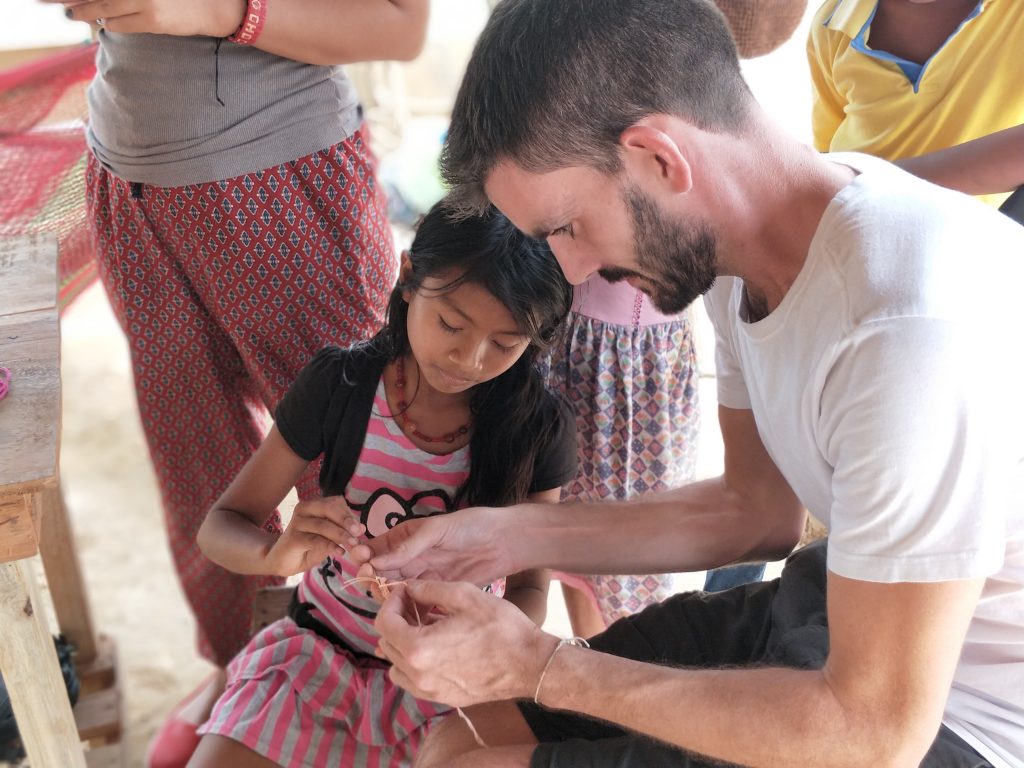
We have a traditional lunch of fish, rice and potatoes before saying goodbye to this wonderfully welcoming family.
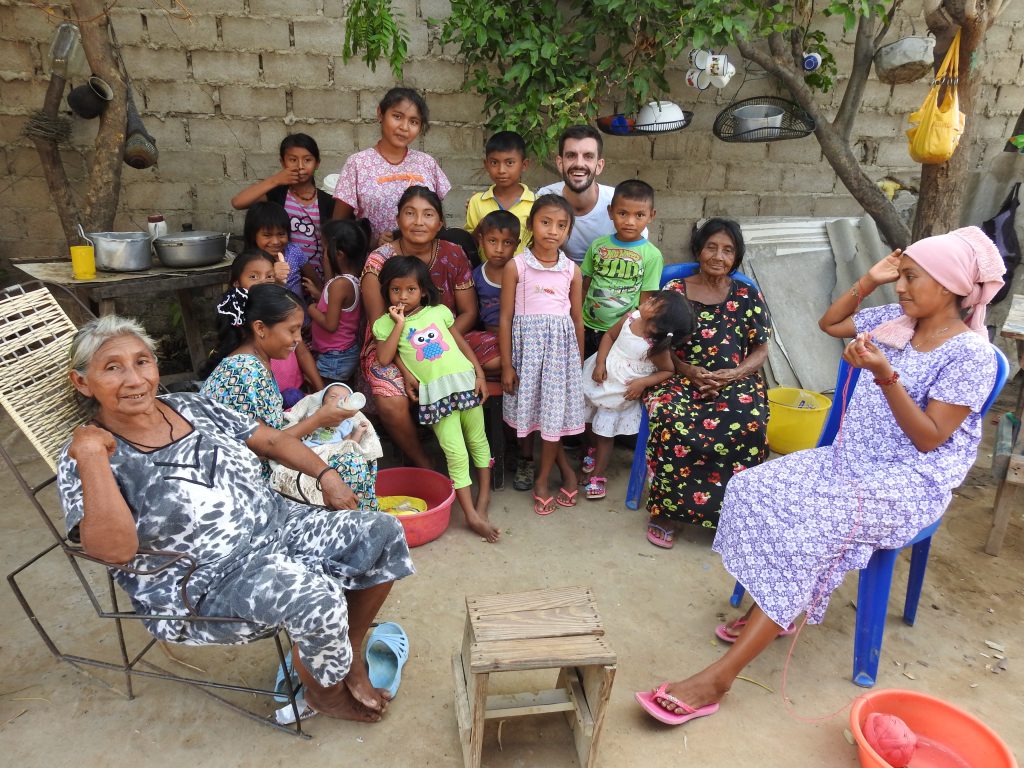
Staying in Riohacha area we next go to visit Verónica Nieves and her families house. Here they are working on some Mochila for TMAC. Our first look at the new collection, excited is not the word. For this collection, we are also making matching bracelets something that as far as we know has never been done before.
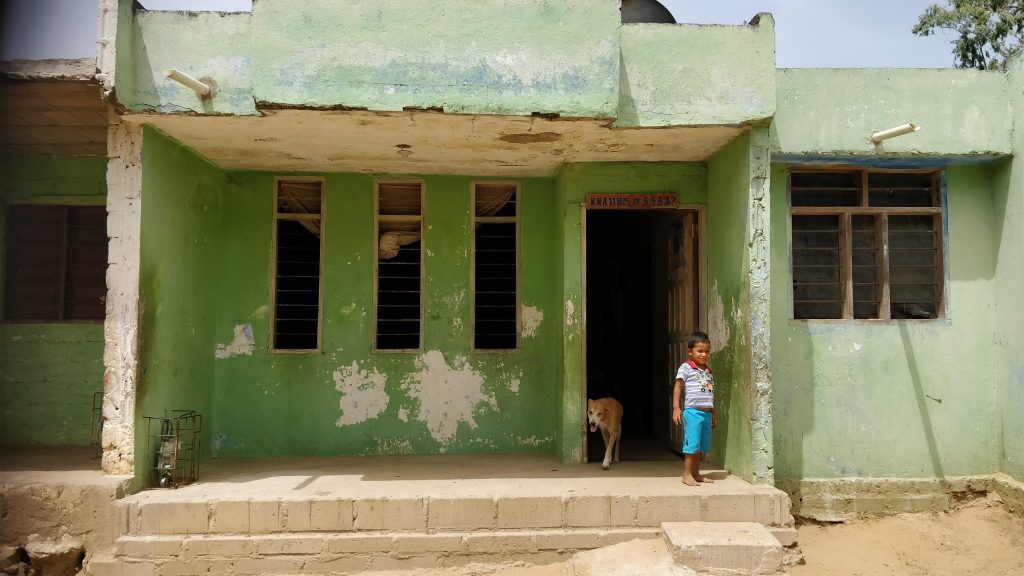
It’s here we learn the skills involved in making the straps for the bags. A completely different process and whole other skillset. The family once again gather and work under a small thatched roof in the garden along with the chicken coop. It’s such a close-knit family you can really feel the bond they have and it’s the making of these products that really brings them together as a unit.
It’s been a day of learning for TMAC and also a new found respect for the skills involved and the way they live.
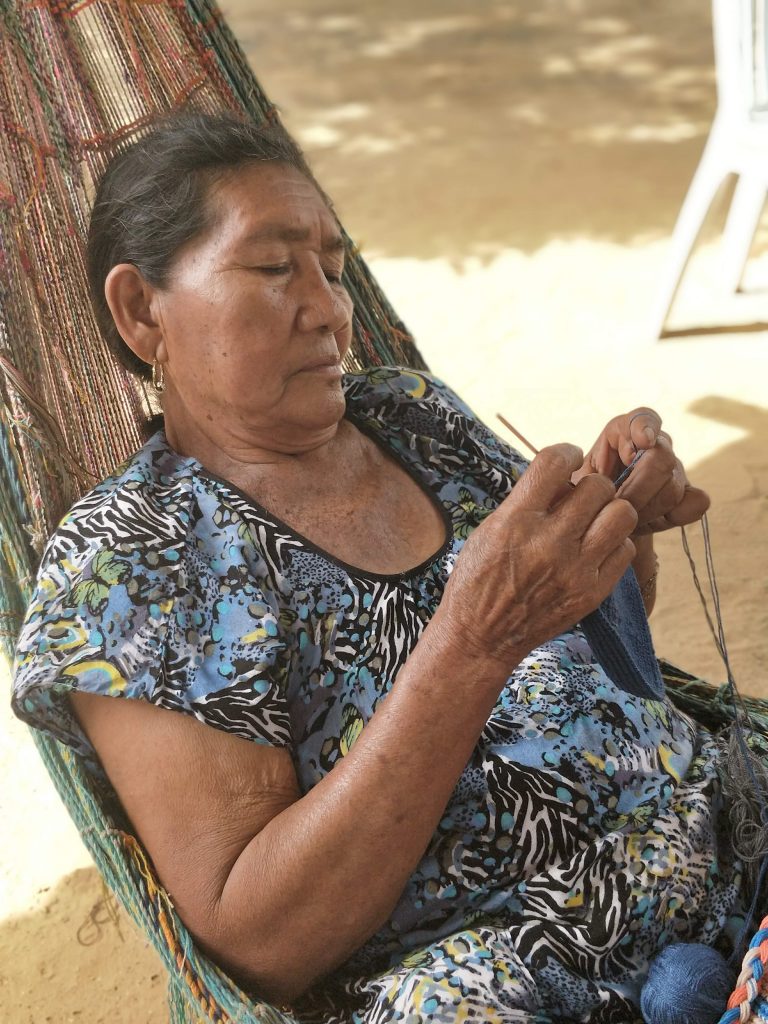
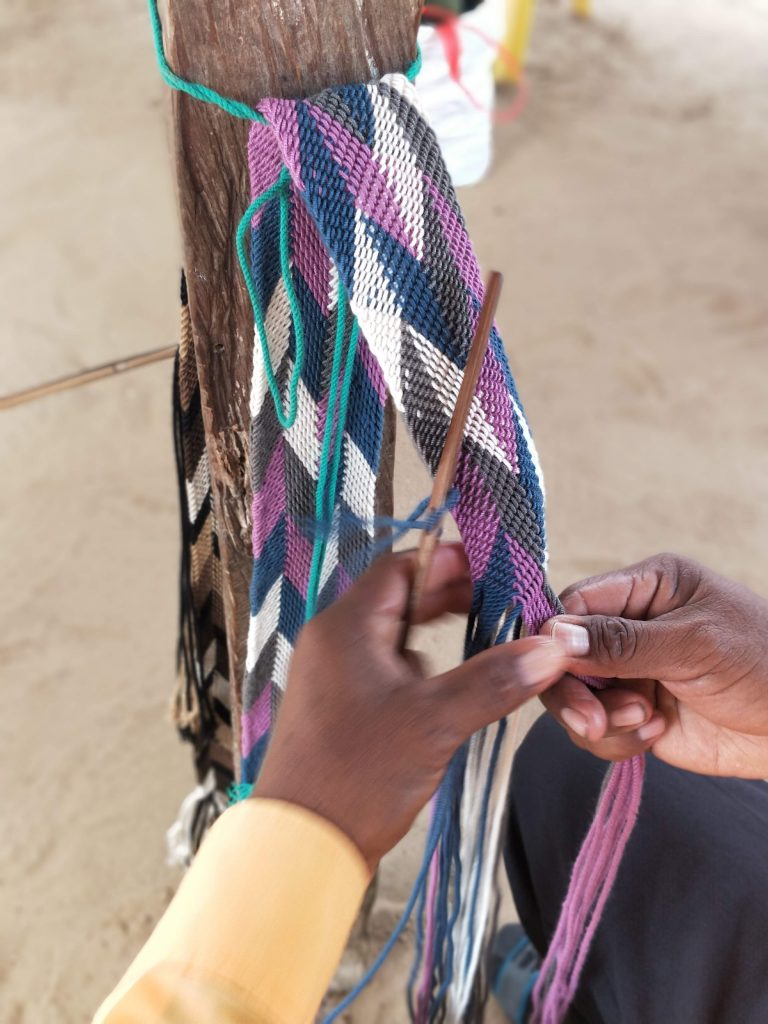
It’s day two and we are visiting Marisol’s house. She is making out double thread patterned bags along with the yoga bag straps. Today she is taking us through the process along with many different skills from twisting the thread to the Wayuu arts mainly found in Venezuela.
Living just outside Riohacha Marisol lives in one small building with her 7 family members, the welcome among the whole family is so warm, they are truly excited that we want to learn about there way of life and artisanal skills.
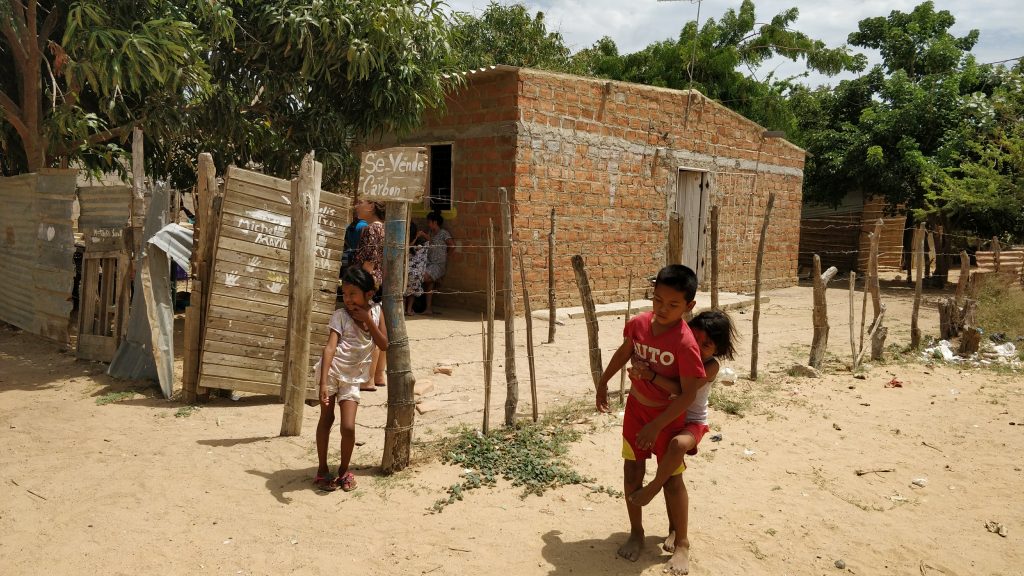
We dive straight into learning to Knit with two colours this time. It’s another skill level up changing between the two colours is tricky but making sure you do it at the right stitch to work the design is almost impossible. Look at some of our designs and you can imagine the depth of skill required.
The yoga matt carriers are made again all by hand. Weaving the different colours into the required design by using eight fingers. It’s easy to get confused and ruin the design or weave to lose and it all falls apart. When complete its the finishing that takes the product to another level. Stitching the loops closed making a perfect strap.
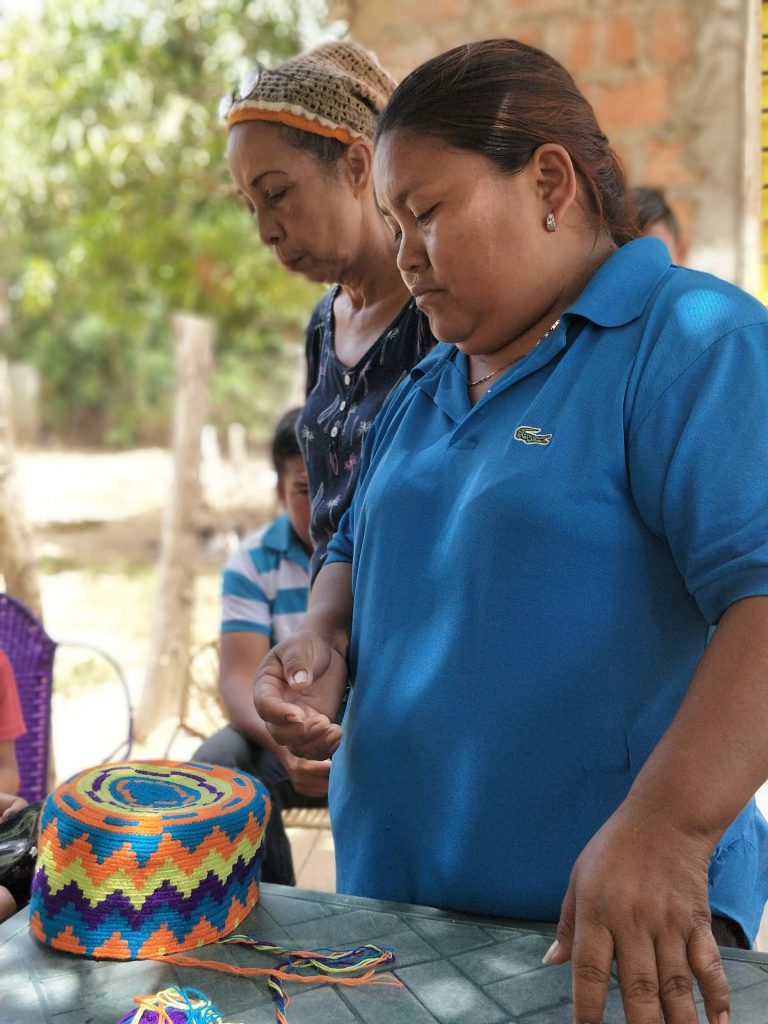
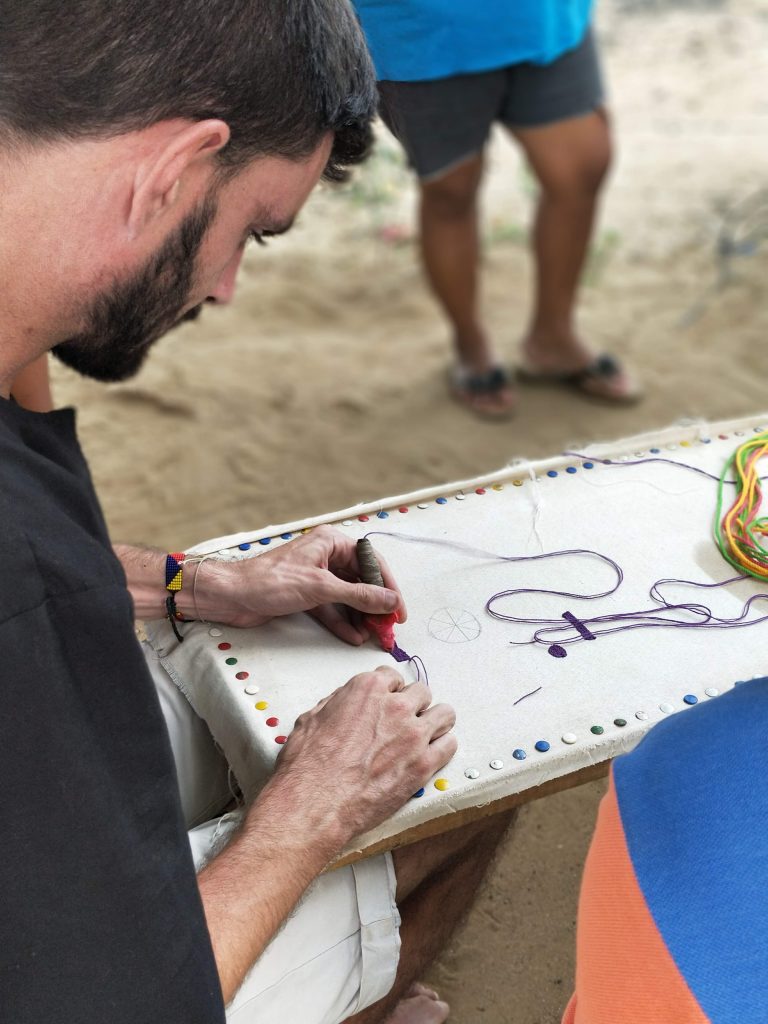
Taking a break and we are surprised by the children bringing out their English homework. There is a real want to learn. Asking many questions and wanting help with the work but not to do it for them. TMAC is very impressed.
After lunch we take a walk around the community which is made up of a mix of Colombians and Wayuu, we are told in general the community are united but if it comes preferential treatment for anything the Wayuu will always come last or be worse off.
A game of football is started in the street and it quickly turns to Colombia v England. Revenge for the world cup is truly taken.
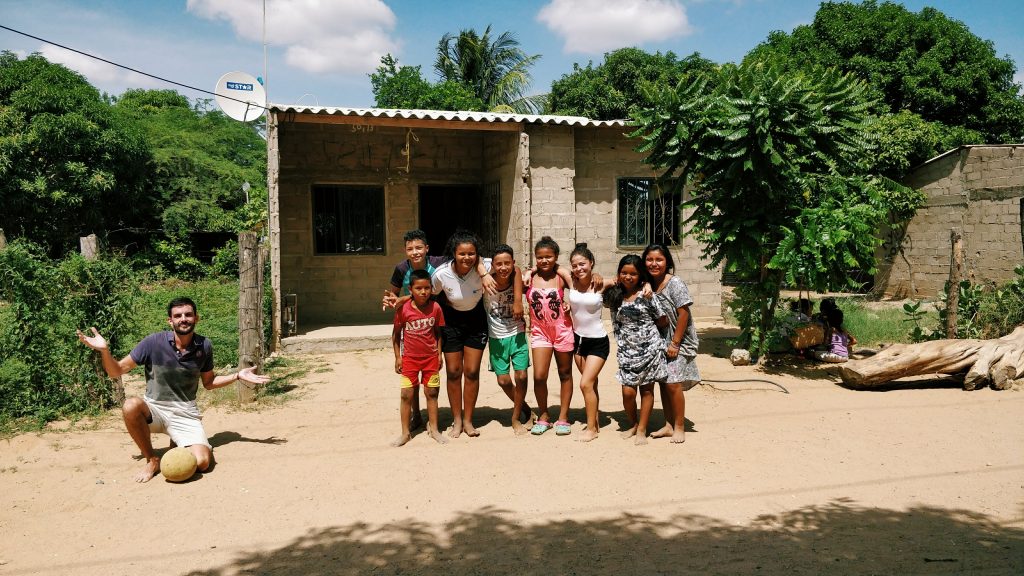
It’s the pride in the work, the want to work and the incredible skills involved that really leave us in love with the family. It’s a sad goodbye today we have been truly welcomed into the family.
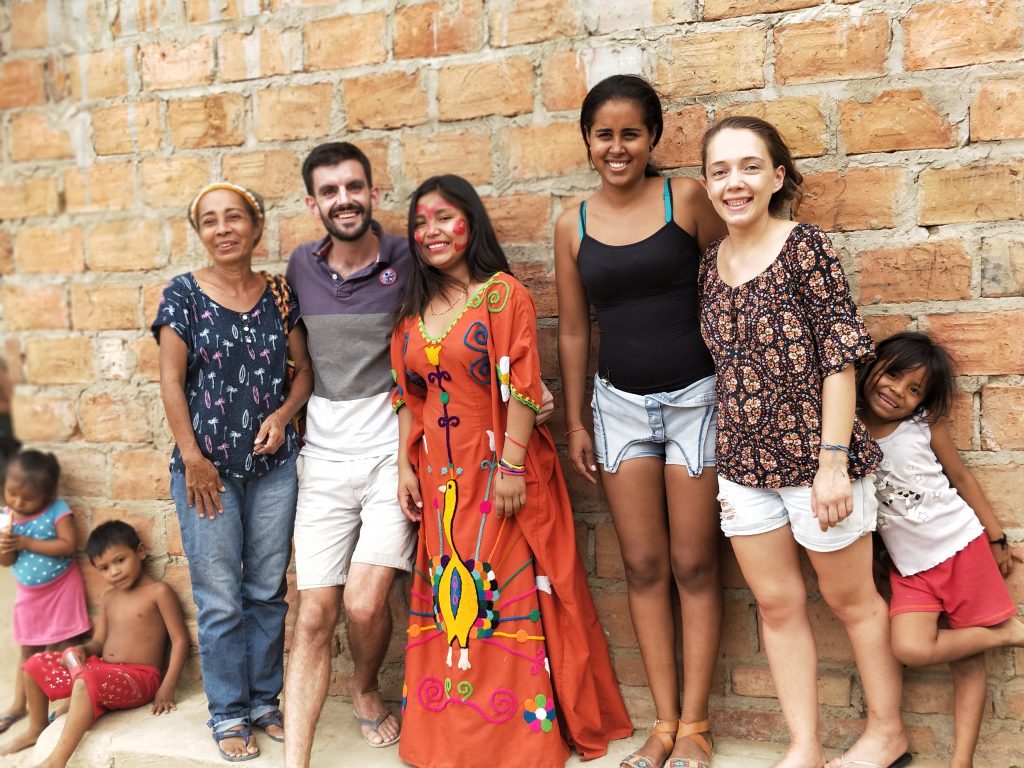
La Guajira
We have so far been able to dive into the Wayuu world in the city. Today we travel deeper into the desert than anyone other than the Wayuu get to go. We start by travelling to Uriba and the Indigenous capital of Colombia. From here the only way onwards it by motorbike. Even 4×4 can’t get down the small sand paths.
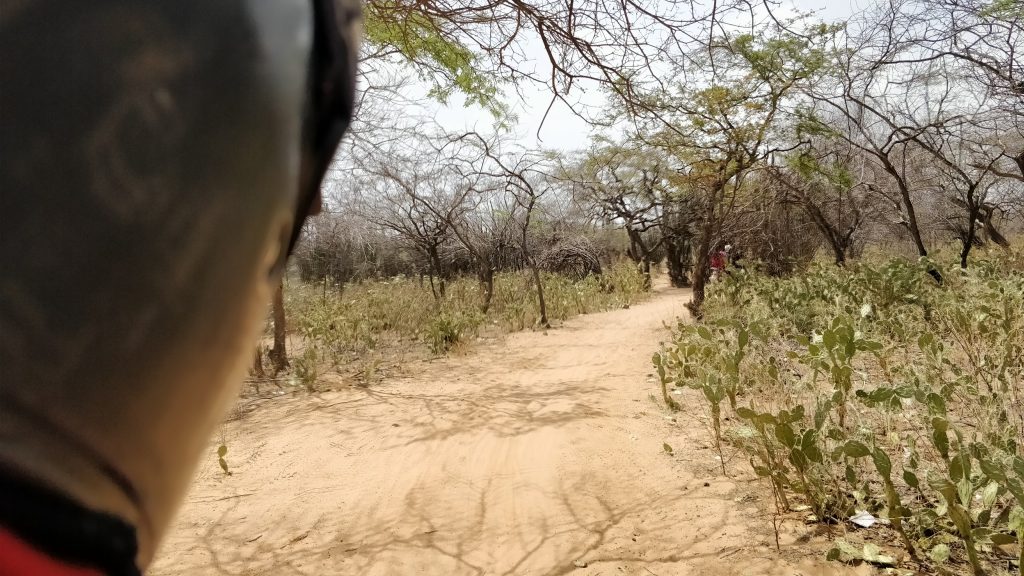
We get together the motor taxis who all have helmets and goggles we only have sunglasses for protection. Its 45 minutes going off road as we have never been before. We arrive at the spacious Rancharia of Yolanda Barros and her family, excited and covered in sand.
This is real Wayuu life as it has been for hundreds of years. A few buildings spaced out, all built in the traditional way out of mud and wood. Scattered around are a few donkeys and chickens.
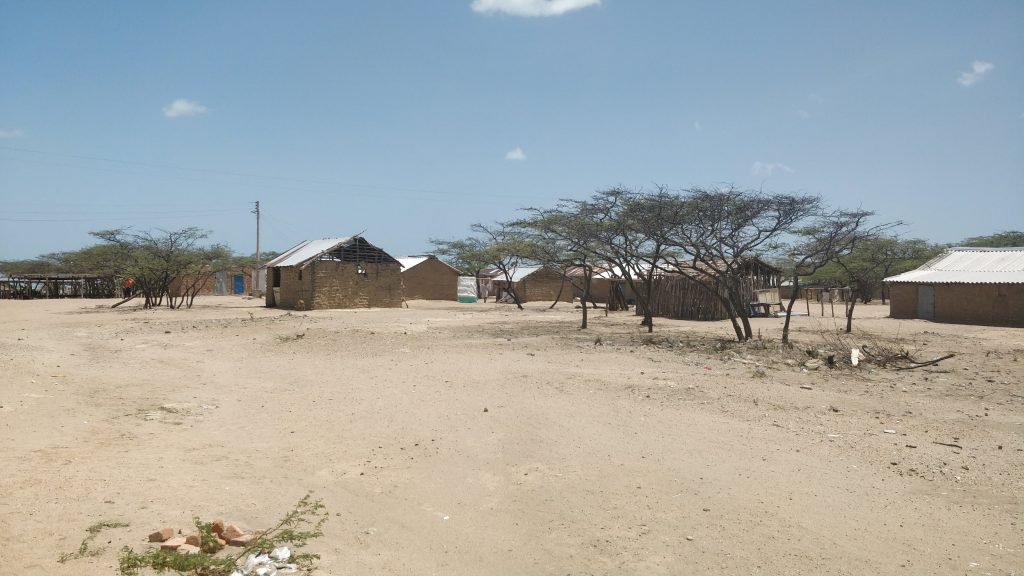
They greet us with coffee tell us of the difficulty of getting to town, with little money they have to take the 4 hour walk to Uriba for any extra food they require. The closest water supply is an hour away.
Yolanda is making our single thread bags, now these are the highest quality with the highest level of detail. Each bag can take one month with the women working four to five hours a day.
The family gather with pride as we are walked through the process all with an interest in what we do and where we have come from. As surprising as life is for us on the rancharia describing life in london is even more surprising to them.
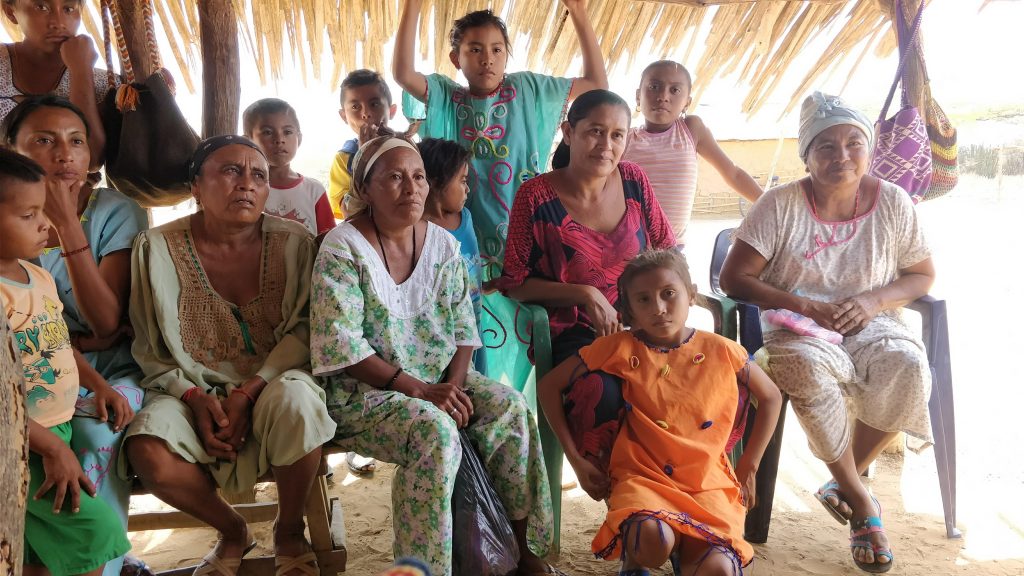
It’s a very simple life on the Rancharia making use of everything in the environment around. them. We are taken on a tour. The kitchen consists of an open fire and small worksurface. Everything from meat, fish and boiling water is made right here. The advantage of being out of the city is the amount of space they have. The only sounds are the animals and the wind in the bushes.
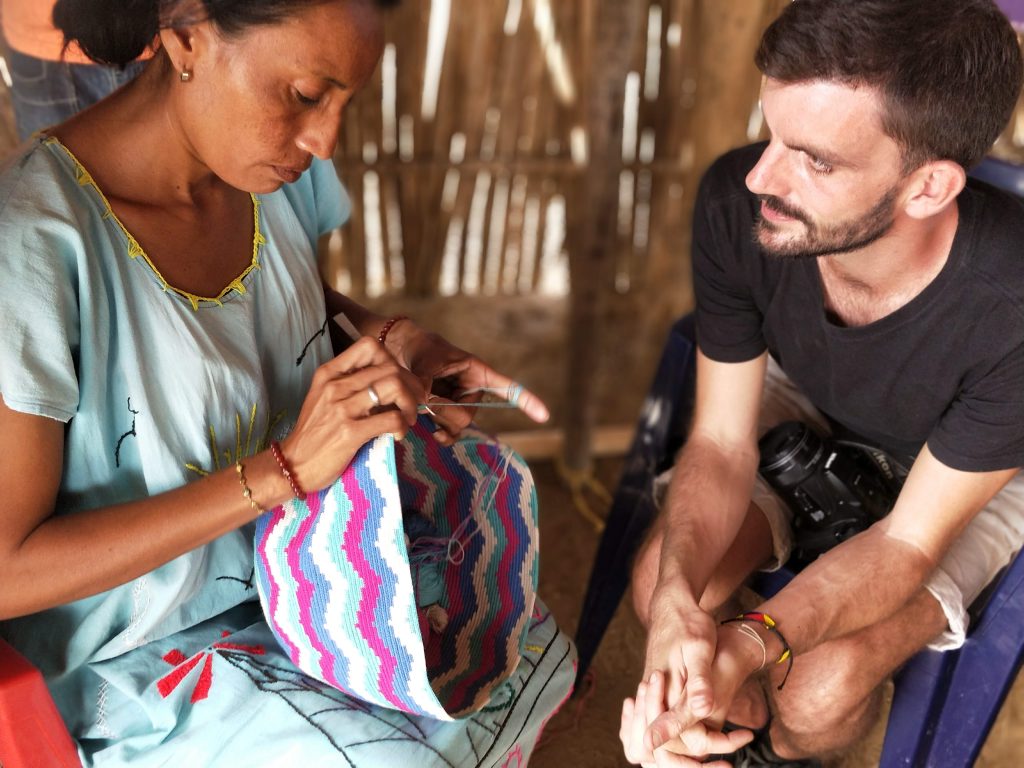
Returning to the family we say our goodbyes and take the 45 minute journey back to Uriba. From here it’s 30 minutes in a taxi and then 20 minutes on a motorbike, this time three on a bike as there are not enough. This is a new experience!
It’s here at Mariluz Ipuanas house on Rancheria Oorokot that we spend the night, on the open fire she puts together a wonderful dinner of meat, rice and fried plantains. The sun sets and as the stars appear it’s like nothing like we have ever seen. The perfectly clear sky with no light pollution leaves us in awe.We settle into our hammock for the night with just the sound of goats calling in the background.
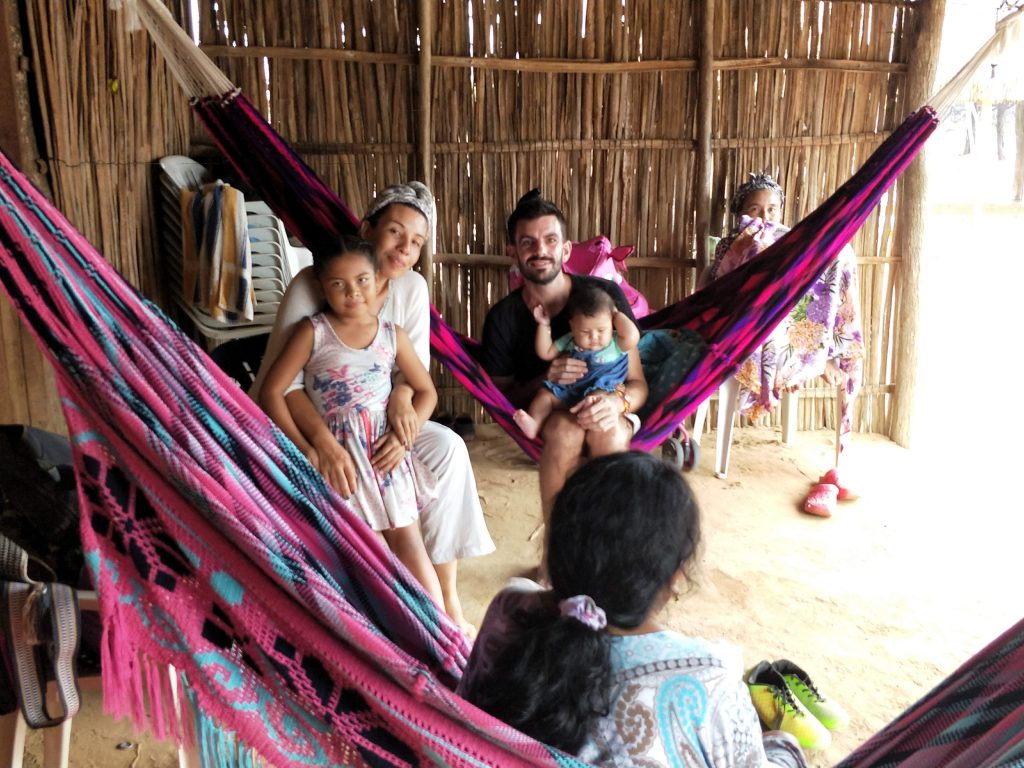
Its an early start and we are shown around the Rancharia they have built a small kindergarten for the children. Further afield there have been a few social projects. The first is a farm and the second being a water extraction plant. In return the people have allowed a train line to be put across their land splitting the Oorokot families in two for the large coal mine in La Guajira. Now why the farm is sorely needed there has been a lack of training in its use which means it has fallen into disrepair the same goes with the water plant. The people here need ongoing help and education and not one off gestures from big business. The train line has change the landscape and the community forever.
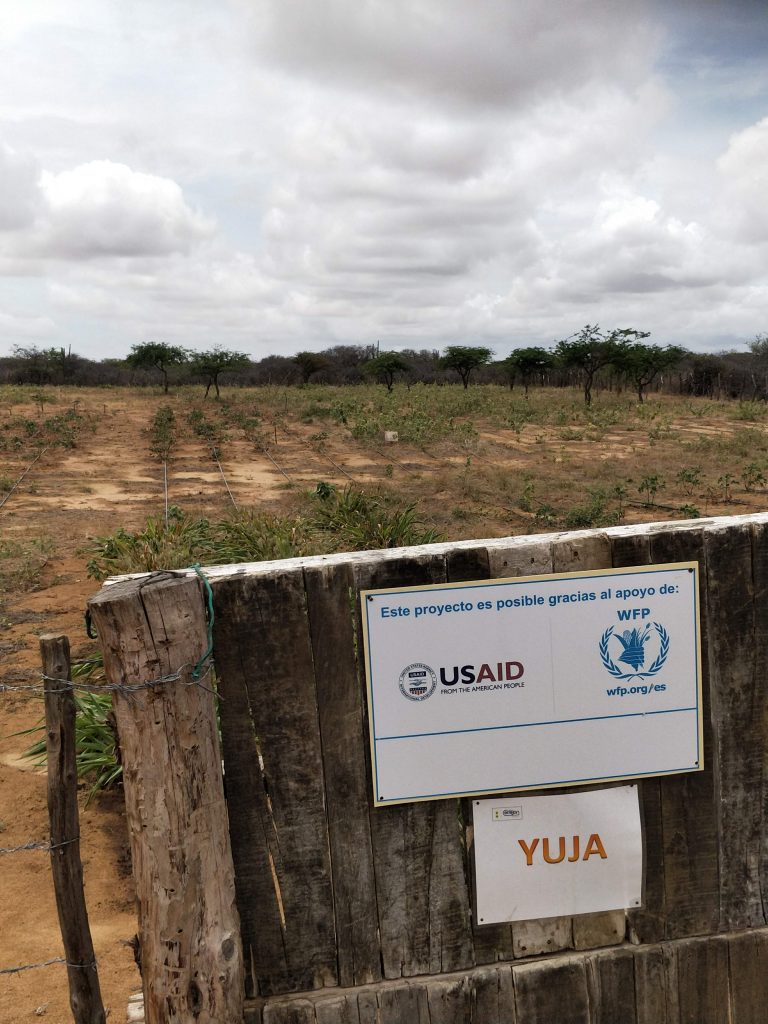
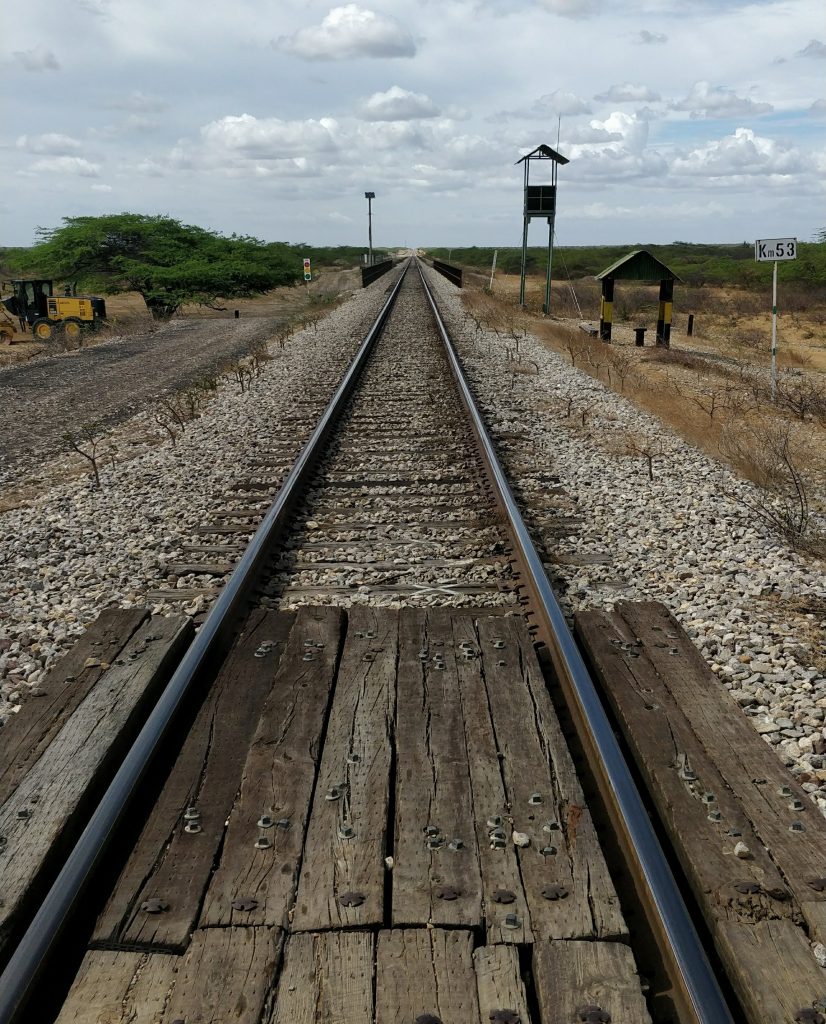
Returning to the families home we have a workshop on making the bracelets. A very intricate process all made using just your fingers, the designs again all being in your head. Each bracelets takes at least a full eight hours to make.
It’s with sadness we finish our trip with the Wayuu people through La Guajira. Getting under the skin of the people we find an incredibly welcoming and skillful people who through no fault of their own are persecuted against. There is a real want to keep their traditions alive and its most apparent in their artisanal ways.
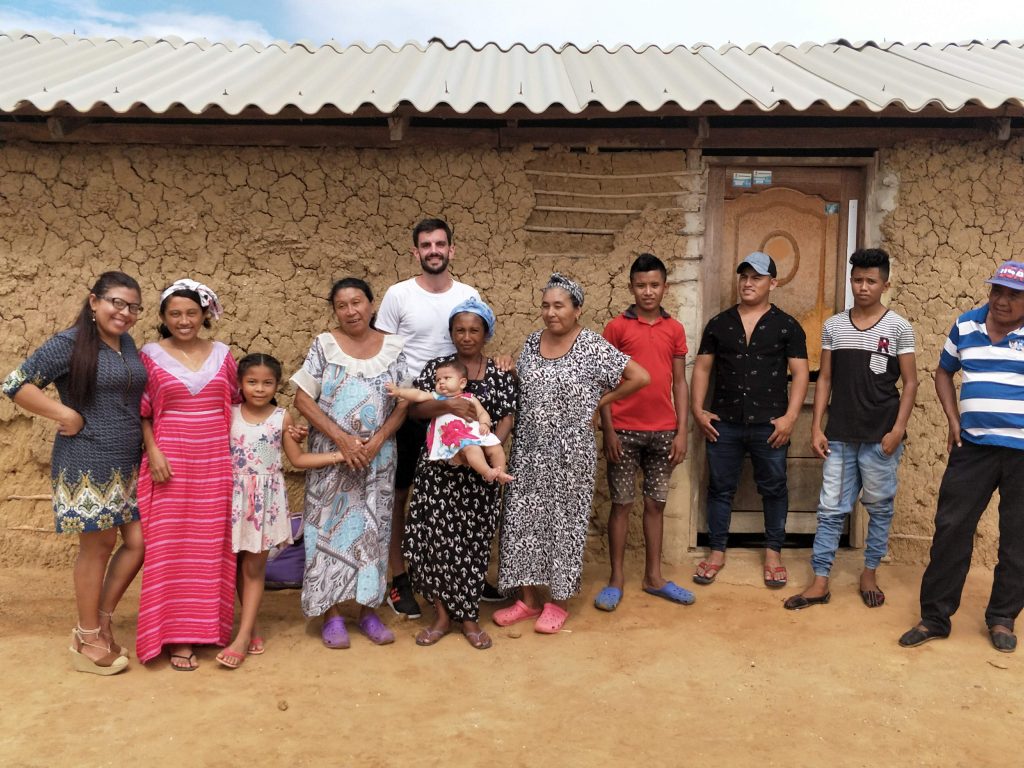
We are proud and honored having been welcomed by the community and shown their ways, having a chance to learn the skills. This is a community in need of help, TMAC is going to do everything we can to help keep their traditions alive for future generations and help them receive the fair wage they deserve.
At each stage of our journey, we supplied all of the food, brought gifts for the families and supplied materials for their next projects.



No Comments